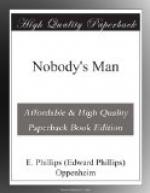“I have read everything Tallente has ever written, and I have never come across any such article,” Dartrey declared promptly.
“You have never come across it because it was never published,” Miller continued, “and yet the fact remains that it was written and offered to the Universal Review. It was actually in type and was only held back at the earnest request of the Government, because on the very day that it should have appeared, an armistice was concluded between the railway men, the miners and the War Council, and the Government was terrified lest anything should happen to upset that armistice.”
“Is this true, Tallente?” Dartrey asked anxiously.
“Perfectly. I admit the existence of the article and I admit that it was written with all the vigour I could command, on the lines quoted by Miller. Since, however, it was never published, it can surely be treated as nonexistent?”
“That is just what it cannot be,” Miller declared. “The signed manuscript of that article is in the hands of those who would rather see it published than have Tallente Prime Minister.”
“Blackmail,” the latter remarked quietly.
“You can call it what you please,” was the sneering reply. “The facts are as I have stated them.”
“But what in the world could have induced you to write such an article, Tallente?” Dartrey demanded. “Your attitude towards Labour, even when you were in the Coalition Cabinet, was perfectly sound.”
“It was more than sound, it was sympathetic,” Tallente insisted. “That is why I worked myself into the state of indignation which induced me to write it. I will not defend it. It is sufficient to remind you both that when we were hard pressed, when England really had her back to the wall, when coal was the very blood of life to her, a strike was declared in South Wales and received the open sympathy of the faction with which this man Miller here is associated. Miller has spoken plainly about me. Let him hear what I have to say about him. He went down to South Wales to visit these miners and he encouraged them in a course of action which, if other industries had followed suit, would have brought this country into slavery and disgrace. And furthermore, let me remind you of this, Dartrey. It was Miller’s branch of the Labour Party who sent him to Switzerland to confer with enemy Socialists and for the last eighteen months of the war he practically lived under the espionage of our secret service—a suspected traitor.”
“It’s a lie!” Miller fumed.
“It is the truth and easily proved,” Tallente retorted. “When peace came, however, Miller’s party altered their tactics and the hatchet was to have been buried. My article was directed against the trades unions as they were at that time, not as they are to-day, and I still claim that if public opinion had not driven them into an arrangement with the Government, my article would have been published and would have done good. To publish it now could answer no useful purpose. Its application is gone and the conditions which prompted its tone disappeared.”




